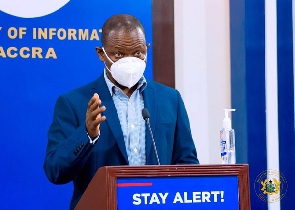The Ghana Health Service’s (GHS) new strategy for the management of COVID-19 is to give priority to symptomatic cases under its testing regime.
This means that persons who present with signs and symptoms of COVID-19 and are sick, as well as all the contacts of those who confirmed positive, would be tested promptly.
Dr Patrick Kuma-Aboagye, the Director-General of the Ghana Health Service, announced this at the Ministry of Information’s press briefing in Accra, on Tuesday.
Additionally, he said, samples taken from exposed health workers, students and returnees would also receive immediate attention to ensure that they were quickly taken care of if tested positive, or be released without further delays if they proved negative.
He also said if someone had died without a proper history of the cause of death, the sample taken would be given priority to ensure the proper handling of the body to prevent contamination should it be a case of COVID-19.
Dr Kuma-Aboagye explained that the idea was to avoid the perpetuation of the backlog of samples due to the challenges earlier experienced by the testing centres regarding the shortage of test kits.
He, however, explained that during the period, the testing centres were giving priority to samples from the selected groups and that accounted the number of positives going up.
“A sample that is released two weeks after it is taken has very little public health and clinical meaning,” he said.
Dr Kuma-Aboagye said currently, all suspected cases of COVID-19, whether the individuals were sick or not, were treated equally as patients with the infection until their results had proven otherwise.
However, those who were sick were separated and housed differently to prevent the infection of others.
The Director-General urged citizens to maintain the adherence to the safety and preventive protocols, which included regular hand washing with soap under running water, or use of hand sanitisers, avoiding the touching of face (eyes, nose and mouth), and ensuring the proper handling of face covering.
“It is also important to observe the required social distancing rule when in public places, avoid close contact with sick persons, ensure regular disinfection of items and surfaces such as remote controls, mobile phones, door handles and washrooms, and quickly dial the 311, 112 helplines for assistance and further information on COVID-19,” he advised.
Meanwhile, Ghana currently has a COVID-19 active case count of 3,505, out of which 26 are severely ill, with eight being critical and four on ventilators.
The country’s cumulative COVID-19 positive cases are now 28,000 out of which more than 25,000 persons, representing 84 per cent, have recovered.
General News of Wednesday, 22 July 2020
Source: GNA

















